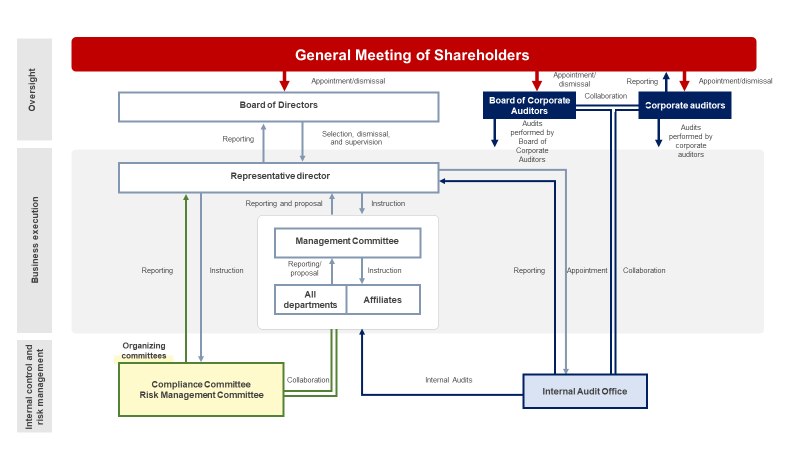Sustainability
Basic Philosophy & Structure
Basic Philosophy on Corporate Governance
Our basic philosophy on corporate governance focuses on earning the trust of stakeholders, including shareholders, business partners, employees, and service users, while ensuring stable and sustainable growth of corporate value. To achieve this, we have adopted an Audit and Supervisory Committee system and an Executive Officer system. These measures separate decision-making and supervision of management from business execution, enabling swift and efficient management while ensuring soundness and transparency, which we recognize as one of our highest management priorities.Corporate Governance Structure
Our corporate governance structure is illustrated as follows:
Reasons for Selecting the Current Corporate Governance Structure
Our governance structure includes eight directors, five of whom are outside directors. Outside directors are selected for their expertise as business professionals, lawyers and accountants. This structure has been adopted to achieve the rationalization and efficiency of management, ensure compliance with laws and regulations, protect minority shareholders, invigorate the Board of Directors through advanced discussions and proposals, enhance the quality of key internal meetings, and facilitate collaboration among the Audit and Supervisory Committee, internal audits, and accounting auditors.Outline of Our Corporate Governance System and Reasons for Its Adoption
In order to further enhance corporate governance framework, we transitioned to a company with an Audit and Supervisory Committee, based on the resolution of the 8th Annual General Meeting of Shareholders held on July 27, 2023. Directors who serve as Audit and Supervisory Committee members (hereinafter "Audit and Supervisory Committee Members") hold voting rights on the Board of Directors as its members. By fulfilling audit functions and strengthening the supervisory function over the execution of business by the Board of Directors, we aim to improve the transparency of management and the speed of decision-making. Additionally, by establishing the Nomination and Compensation Committee, we ensure objectivity, transparency, and fairness in the evaluation and decision-making processes regarding the nomination and compensation of directors and other officers, thereby further enhancing our corporate governance framework. Furthermore, by enabling delegation of authority for decisions on significant business execution to directors, we strive to accelerate and streamline business operations under the appropriate supervision of the Board of Directors.As corporate bodies, we have established the Board of Directors, the Audit and Supervisory Committee, and the Accounting Auditor. In addition, we have set up the Nomination and Compensation Committee and the Management Meeting as supplementary bodies. Details of each corporate body are as follows.
(a) Board of Directors
The Board of Directors consists of five directors (excluding directors who are Audit and Supervisory Committee members) and three Audit and Supervisory Committee members. In addition to holding regular monthly Board of Directors' meetings, extraordinary meetings are held as necessary. As the Company's decision-making body for management, the Board of Directors makes decisions on significant matters based on laws, the Articles of Incorporation, and the Board of Directors Regulations, while also supervising the execution of duties by each director and executive officer. In addition, an annual evaluation of the effectiveness of the Board of Directors is conducted to enhance its effectiveness and to strengthen corporate governance and improve corporate value.(b) Audit and Supervisory Committee
The Audit and Supervisory Committee consists of three directors, all of whom are outside directors. In addition to holding regular committee meetings every month, extraordinary meetings are held as necessary. Each Audit and Supervisory Committee member attends significant meetings, including the Board of Directors, and exercises voting rights as members of the Board to supervise the execution of business operations. In addition, the committee conducts audits related to the execution of directors’ duties and the internal control system by investigating the company's financial status, exercising authority over the appointment and dismissal of accounting auditors, and overseeing matters related to executive remuneration.Each committee member audits the appropriateness and validity of decision-making regarding the execution of directors' duties, the establishment and operation of the internal control system, and the methods and results of audits conducted by the accounting auditor, and examines the necessity of the selection and dismissal of the Accounting Auditor. A survey is also conducted among the members of the Audit & Supervisory Committee to evaluate its effectiveness.
